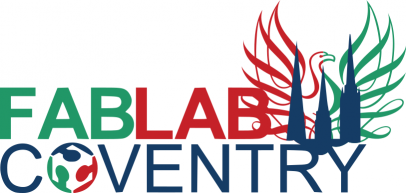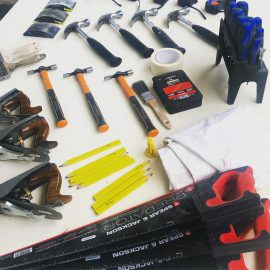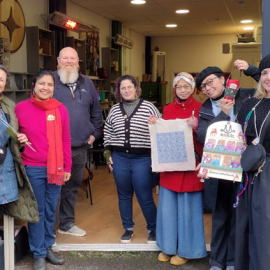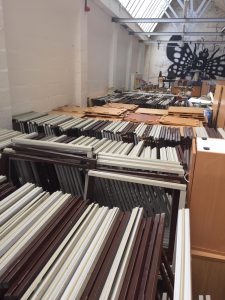
1,000 pieces of furniture upcycled and donated to 30 local organisations and over 6,000 pieces of PPE donated to community and health care service providers.
Nestled in an unassuming industrial unit at FarGO Village – Coventry’s creative quarter – is a furniture factory with a very bold objective; to meet and improve the community and housing needs of all residents across Coventry within a creative, friendly space that allows for community-led integration. The FabLab Eco Furniture Factory is Coventry’s second FabLab facility that is delivering home and community makeovers in Coventry.
FabLab’s are community maker spaces that are open to everyone and provide skills, support and access to equipment to make almost anything. FabLab Coventry was established by Coventry University.
With the increasing need to live more sustainable lives, the FabLab’s Eco Furniture Factory supports residents to turn ideas into reality and gives new life to once old, outdated or broken furniture.
Born out of the MiFriendly Cities project, led by Coventry City Council, the FabLab’s Eco Furniture Factory applies the same ethos of using innovative approaches to integration in a way that involved the whole community by providing asylum seekers, refugees and migrants with opportunities to make a meaningful and positive contribution to the community. Through its regular repair cafes, furniture upcycling and free courses in paining, decorating, DIY and carpentry, the FabLab’s Eco Furniture Factory is committed to promoting sustainability from a number of perspectives. Whilst a key aim is to provide refugees and migrants with the opportunity to certify their skills in a new country, and thus increase job opportunities, participants are encouraged to ‘give back’ through using these skills to give new life to old, outdated or broken furniture. These pieces are then donated to those most in need. Critically, housing represents one of the most common reasons for refugees and migrants to seek support, but poor quality housing can be a problem faced by the wider community, and thus the FabLab’s Eco Furniture Factory approach is inclusive to all and has become an exemplary of using innovation to support community-led integration and sustainability in a win-win approach to a common urban challenge.
Although the pandemic put an immediate stop to all face-to-face activities, the FabLab’s Eco Furniture Factory did not want to waste community resources that could be of benefit beyond the MiFriendly Cities project participants, and so quickly switched from teaching to producing PPE> Staying true to the commitment to always reuse and recycle, 4000 tension bands were produced using scrap material and delivered to community organisations, nurses and local NHS facilities. In addition, local hair companies were donated PPE in order to support them to reopen their businesses.
For example, Coventry business owner, Louise from Hoochie, had struggled to purchase more than two visors due to the high demand, and without this donation would not have been able to open. As a testament to the Eco Furniture Factory’s high standard, Louise informed us that:
“[the visors] are more comfortable to wear than the ones purchased and do not mist up due to the design”
Louise, hoochie owner
With the PPE needs of the local community having been successfully met, serendipitously Coventry University’s Estates department needed to make drastic changes to be able to work safely under government guidelines and consequently provided the Eco Furniture Factory with access to over 1000 pieces of surplus furniture. The team quickly assessed local needs and put an open call out to local community organisations and volunteers via social media. The Eco Furniture Factory had an exceptional response of 98 requests, and so quickly got back in contac with their migrant volunteers to help clean, repair and distribute the furniture to those most in need. Due to the unexpected nature of the pandemic, forcing us all to find new ways to work or learn from home or in a socially distanced manner, it was found that a wide variety of local community centres, schools, arts projects and small businesses would not be able to open safely and adhere to government guidelines for social distancing without new furniture. Examples of recipients of up-cycled furniture donations include: Arty Folks, who needed 30 tables in order to run socially distanced workshops for people with mental health problems; Langar Aid, who work with the homless, delivering food parcels; Gourmet Food Kitchen and Choc N Roll; Radford Community Centre; Holbrooks Community Centre; Bishop Ullathorne School and Our Lady of Assumption Primary School.
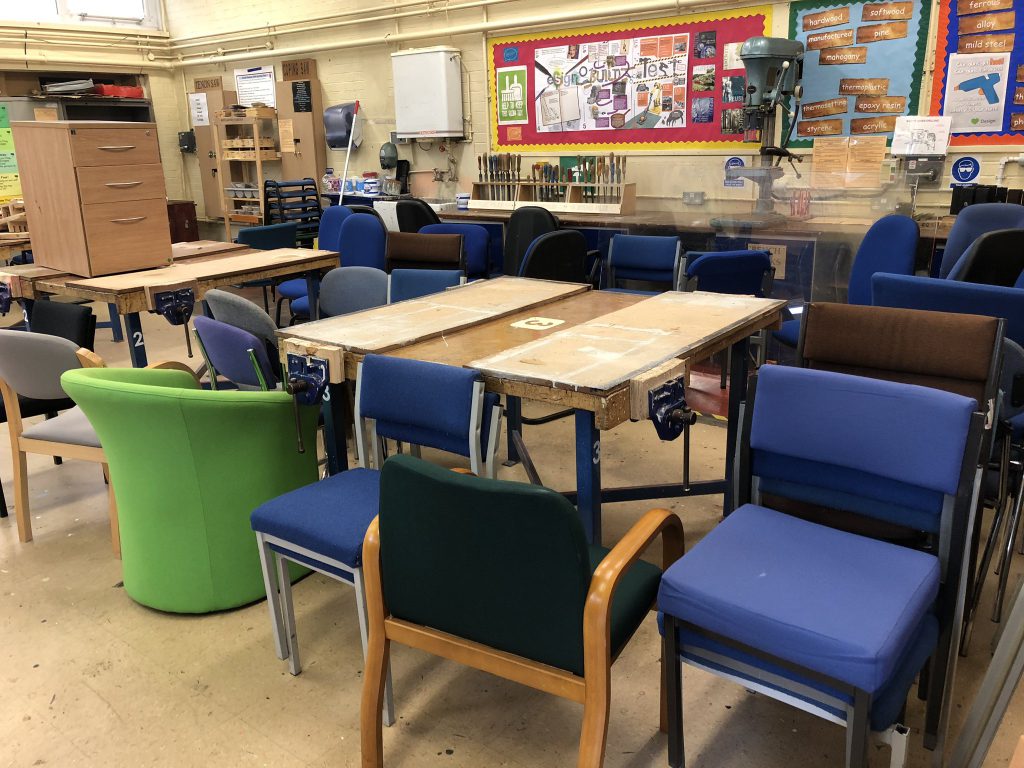
Regardless of this new community reach, the Eco Furniture Factory was still mindful of the needs of the local refugee and migrant community. The Coventry Refugee and Migrant Centre – a partner in the MiFriendly Cities project – needed to find a way to show investors and stake holders what their extension could look like following investment, however as people were no longer allowed on site, they needed an innovative solution. As a workaround, the FabLab’s Eco Furniture Factory engaged a MiFriendly Cities volunteer with architectural skills who produced a 3D model of the space as a solution.
Everyone involved with the FabLab’s Eco Furniture Factory are immensely proud of the Factory’s achievements. The feedback received from Coventry University’s Estates team is indicative of the sentiments felt by all who have been involved with the Factory during this unprecedented and testing period:
“The work the FabLab’s Eco Furniture Factory project team have carried out to rejuvenate and re-distribute over 1,000 pieces of Coventry University donated furniture… is nothing short of a tremendous achievement… and [we] are honoured to have played a small part in your achievement.
Coventry University’s Estates Team
The passon you have for your work and how you care for our wider communities is an enormous credit to you and reflects well on everyone at Coventry University”
